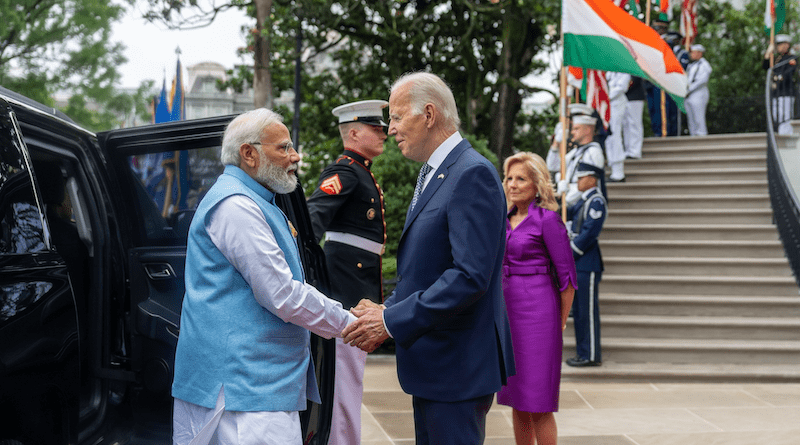Indo-US Strategic Alignment – OpEd
The Indo-US strategic alignment refers to the growing partnership and cooperation between India and US in various domains, including political, economic, defense, and diplomatic areas. This alignment has developed over the years due to shared interests and common values. Both India and US are democratic nations with a commitment to individual freedoms, rule of law, and human rights. This common foundation forms the basis for strong diplomatic ties. The two countries have been increasing their economic engagement through trade, investments, and collaboration in areas such as technology, energy, and infrastructure.
The Indo-US partnership in the defense and security realm has grown significantly. They engage in joint military exercises, defense technology transfers, and information sharing to address regional and global security challenges. Both nations have a shared interest in combating terrorism and extremism. They exchange intelligence and cooperate on initiatives to counter terrorist threats.
Likewise, the issue of human rights in India has been a topic of discussion and concern, both domestically and internationally. The United States and other countries have at times raised concerns about human rights violations in India, including issues related to religious freedom, treatment of minorities, and other civil liberties.
The extent to which US or any other country addresses or prioritizes human rights issues in its relations with India can vary over time based on a range of factors, including the specific leadership in power, the geopolitical context, domestic and international pressures, and more. Similarly, various countries of the world are viewing India through the prism of global market and economic lenses while completely ignoring human rights and rights of minorities under Modi government.
The prioritization of investment over human rights in any country, including India, can also be influenced by a complex set of factors and considerations. International relations are often shaped by a balance of economic, political, and strategic interests, and decisions made by countries are influenced by a variety of motivations. Strategic interests and geopolitical alignments play a significant role in international relations. Countries might prioritize maintaining strong diplomatic relationships with other nations due to shared security concerns, regional stability, or alignment on certain global issues.
India has seen a steep increase in human rights abuses against its citizens, which the international community has so far refused to call out. Regardless of its growing military and economic power, India must be held to account if rule of law and the existing human rights regime are to be universally respected. In Indian case, Unfortunately, India’s emerging international role has coincided with rising authoritarianism at home. The Bharatiya Janata Party (BJP)-led government is using draconian laws to intimidate and arrest some activists, peaceful critics and independent journalists who express disagreement with government laws and policies. The government has enacted and enforced laws that systematically discriminate against minority Muslims and Christians.
BJP leaders frequently make speeches that can incite communal violence by their Hindu-majoritarian affiliate groups. Some authorities have effectively normalized violence through bias, punishing peaceful protests by religious minorities while failing to prosecute the pro-government supporters who assault them. After the government revoked its constitutional autonomy in 2019 and split the Muslim-majority Jammu and Kashmir province into two federally governed territories, Kashmiris continue to face repression.
Indian governments, in recent times, unwilling to risk bilateral relationships, have rarely played a major part in promoting respect for human rights in other countries, deeming them internal affairs. Now, the escalating abuses at home, with its angry and defiant response to criticism, can make the Modi government reluctant to risk a larger international role in promoting human rights. But that would come at a real cost for those around the world who would benefit from India taking up their cause.
But if the Modi administration wants to be taken seriously on the world stage, it also needs to address its own abusive governance. If it wants global progress on women’s right to live without fear, violence and discrimination, it cannot tolerate the daily mistreatment that millions of Indian women endure, ignore alleged sexual harassment of its top women athletes, or approve the release of those convicted of gang-rape and murder for political expediency.
The international community should also pressure the Indian government to “walk the talk” on human rights. Currently, India is not signatory to the Committee against Torture and the Committee, the Elimination of Racial Discrimination, or the International Criminal Court. Therefore, it is vital that world leaders pressure the B.J.P. to sign these agreements, both to show that the party is serious about its obligations and to protect those persecuted or attacked within India.

